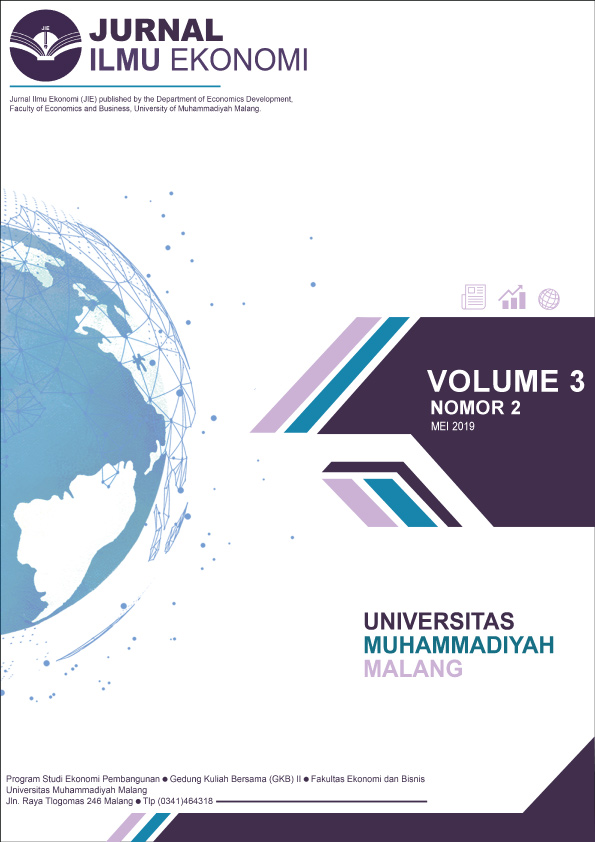STUDI PERSAINGAN USAHA TOKO RITEL TRADISIONAL DAN TOKO RITEL MODERN DI DESA SUNGAI DANAU KECAMATAN SATUI KABUPATEN TANAH BUMBU KALSEL
DOI:
https://doi.org/10.22219/jie.v3i2.8273Abstract
The purpose of this study is to find out how the competition conditions of traditional retail stores with the presence of modern retail store businesses in Sungai Danau Village. in Sungai Danau Village. The method applied in this study is a qualitative descriptive analysis, further utilizing SWOT analysis to compile the strategy upon increasing the store traditional ritel competition. Apparently, the presence of the modern retail store does not make these entire traditional retail store experiencing huge decline in their sales and there were even some traditional retail store stating that the presence of this modern retail store has affected them positively, forcing them to create an innovation in their stores to keep up with the current market trends. On the average, the strategy that has been done by these small stores. Total score from factor of internal strategy is 3,00 and total score from factor of external strategy is 2,65 and highest variabel from SWOT analysis is IFAS 2,25 and EFAS 2,00.
And the strategy that can be done is the S-O Strategy through the build of a one stop shopping concept and the consistent use of direct services. S-T Strategy by maintaining a good relationship with customers, the shop reputation by selling low-priced products and the making of service standardization. W-O Strategy by utilizing assistance from cooperatives and extending the networks and finding supplies in low-cost places. W-T strategy by improving service quality as an attempt to retain customers.
Keywords: Competition, Modern Retail Store, Traditional Retail Store Strategy.
Downloads
References
Amri, F. 2017. Analisis perbandingan jumlah laba pedagang kelontong setelah berdirinya alfamart (studi kasus di kecamatan Sumbawa). Sumbawa; Universitas Tekonologi Sumbawa.
Diantini, A. 2017. Analisis potensi bersaing pasar tradsional terhadap pasar modern di kota Denpasar dan Kabupaten Badung. Bali; Universitas Udayana.
Herdt, 2008, Upaya Pengembangan Usaha Kecil dan Menengah (UKM), Infokop Nomor 25 Tahun XX
Jati, R. 2012. Pasar tradsional versus Liberalisasi bisnis ritel di Indonesia. Malang; Univeritas Negri Malang.
Rachman, T. 2017. Analisis kita toko tradsional (warung) untuk bertahan ditengah maraknya minimarket (Toko Modern) (studi kasus dikecamatan Cisaga Kabupaten Ciamis). Jawa Barat; Universitas Widyatama.
Rangkuti, F. 2006, Analisis SWOT teknik membedah kasus Bisnis, Jakarta: PT. Gramedia Pustaka Utama, 2006, h18-19
Saptarini, A. 2017. Pengaruh adanyan alfamart dan juga indomart terhadap eksistensi warung kecil di kabupaten Pringsewu. Lampung; Sekolah Tinggi Ekonomi Muhammadiyah Pringsewu.
Soleha, E. 2008. Analisis industri ritel di Indonesia. Semarang; Universitas Stikubank Semarang.
Suliswanto, Wahyudi. “Toko Kelontong Mampukah Bertahan”. Bestari, Maret 2018
Utomo, J. 2011. Persaingan bisnis ritel Tradisional vs Modern.
www.bps.go.id, diakses tanggal 23 November 2018.
Downloads
Published
How to Cite
Issue
Section
License
Copyright (c) 2019 Jurnal Ilmu EKonomi JIE

This work is licensed under a Creative Commons Attribution-ShareAlike 4.0 International License.
Authors who publish with this journal agree to the following terms:
- For all articles published in the JIE (Jurnal Ilmu Ekonomi), copyright is retained by the authors. Authors give permission to the publisher to announce the work with conditions. When the manuscript is accepted for publication, the authors agree to the automatic transfer of non-exclusive publishing rights to the publisher.
- Authors retain copyright and grant the journal right of first publication with the work simultaneously licensed under a Creative Commons Attribution-NonCommercial-ShareAlike 4.0 International License that allows others to share the work with an acknowledgement of the work's authorship and initial publication in this journal.
- Authors are able to enter into separate, additional contractual arrangements for the non-exclusive distribution of the journal's published version of the work (e.g., post it to an institutional repository or publish it in a book), with an acknowledgement of its initial publication in this journal.
- Authors are permitted and encouraged to post their work online (e.g., in institutional repositories or on their website) prior to and during the submission process, as it can lead to productive exchanges, as well as earlier and greater citation of published work (See The Effect of Open Access).
This is an open access article and licensed under a Creative Commons Attribution-NonCommercial-ShareAlike 4.0 International License








